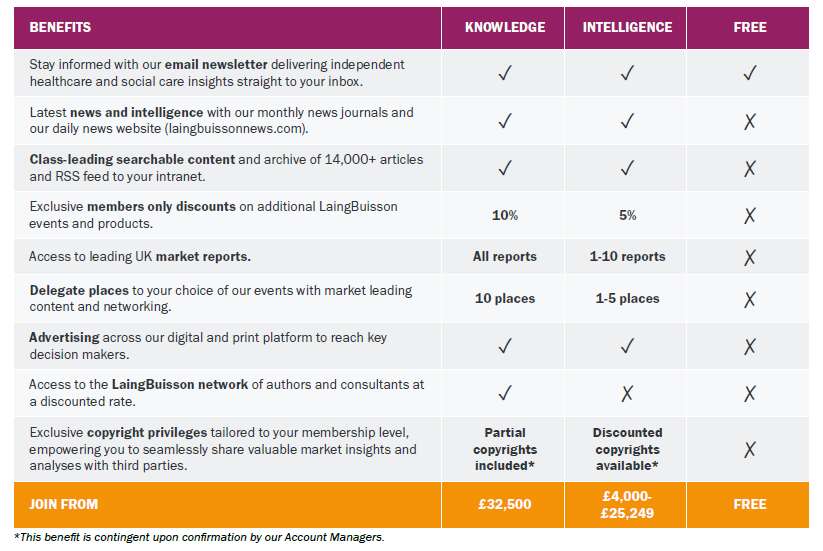Private acute healthcare sector searches for new customer demand
Private acute healthcare sector searches for new customer demand through service development, diversification, and innovative care delivery.
The sixth edition of LaingBuisson’s Private Acute Healthcare UK Market Report has been launched today.
The UK market for private acute medical care in hospitals and clinics was estimated to be worth £5.8 billion in 2018. This is the second year of real terms* decline for the sector, which shrank by 1.1% in 2018 and by 2.1% in 2017.
The reasons for this decline can be found in the stalling of key funding streams. NHS spending on independent sector acute services fell for the first time in 2017 and then again in 2018. Medical cover payouts have been stagnant, down in real terms. Also, there has been a reduction in revenues from overseas embassies as Middle Eastern governments have sought to reduce their bills, though this is expected to level off and improve going forwards, following a sharp drop.
While these sources of revenue have struggled, there has been continued strong growth in the private self-pay market, which increased by 4.8% per annum in real terms in 2018, and by an average of 7.4% over the last five years (2014-2018 inclusive) as people have sought an alternative to joining long NHS waiting lists. Also, against the trend, NHS Trusts have continued to see a real increase in private patient revenues, driven by growth from specialist Trusts in central London.
Nevertheless, private acute medical care in London and the UK remains a popular investment destination for overseas operators, with expectations of long-term growth prospects, and scope to roll-out global delivery models. Of note, Schoen Clinic opened in London in late 2018 and Cleveland Clinic London is set to open a large new private facility in 2020. NMC Health of Abu Dhabi acquired Aspen Healthcare and other new entrants include Mayo Clinic Healthcare in partnership with Oxford University Clinic, ASI Healthcare and Advanced Oncotherapy.
With new supply in a market where demand has struggled to grow, operators are looking at wider funding streams, through opportunities to expand and develop their private service offering and geographic coverage, diversifying into new service lines and propositions, and innovating to meet customer needs. An emerging strategy has been new partnership working including those between independent sector operators, and also those with healthcare funders including insurers and the NHS. Notably within cancer services, operators seek to offer the most advanced diagnostics and treatments, with a number of ventures made by specialist GenesisCare, and with specialists Rutherford Health, and Advanced Oncotherapy emerging, and also a notable cancer service provider agreement between Bupa and HCA.
The market is also focused on the delivery of care pathways to ensure patients are provided with a consistent and smooth service across their care where quality can be better assessed, and crucially which can offer efficiencies and savings to benefit the private acute market, with insurers looking to stimulate demand. In addition, under challenging market conditions, some operators have had to rationalise their operations. Notably BMI Healthcare closed a handful of hospitals during 2019.
The NHS Long Term Plan may also present occasion for NHS work in that it commits to cut waiting lists. While this commitment is likely to be met, at least in part by increased NHS capacity, it is also likely that the independent sector will be needed to help meet (yet to be announced) new waiting targets. Change to NHS delivery, including ‘hot’ and ‘cold’ sites, and integrated care systems support NHS internal provision, though innovative care delivery and specialist services could be sourced across sectors.
Report author, Philip Blackburn, said:
“The independent healthcare market has clearly faced challenges, as growth in some traditional revenue streams stalled recently. This has prompted some busy strategising by hospital and clinic providers to best position themselves to meet future demand trends. Generally, providers recognise the need to develop their service offering to attract demand and meet changing healthcare needs of the population, including diversification into new areas for some, targeting new customer segments (both here and abroad), and capitalising on healthy interest in what UK private healthcare can offer. There have been more aligned relationships between providers and funders with a shared objective to deliver high quality healthcare services but the crucial need to do so more efficiently to offer affordable private healthcare, both insurance and self-pay.”
“LaingBuisson currently forecasts nominal revenue growth of around 2-2.5% in the next three years for UK private acute medical care (before taking account of economy inflation), which remains modest. With new capacity coming on stream during this time, most focused within central London, independent sector hospitals and clinics will be challenged to stimulate new demand to sustain overall market supply – whether private individuals, corporates, insurers, overseas sponsors or the NHS – and compete effectively and efficiently on price and quality.”
Find out more about the Private Acute Healthcare UK Market Report here.
Download press release as a PDF.
* Growth is deflated by UK economy inflation – Consumer Price Index (CPI) used







